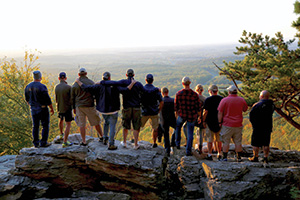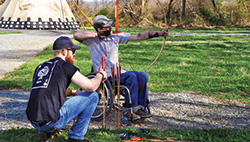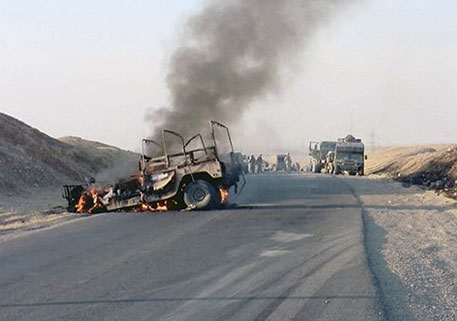DAV is an organization of veterans helping veterans

Every day, nearly 18 veterans take their own lives. It’s a jarring statistic and a conservative estimate that demands unrelenting action until veteran suicide is eradicated.
The DAV Charitable Service Trust is on the front line of this battle, finding and funding programs and organizations that get results by saving veterans’ lives. This includes national initiatives such as Save A Warrior, REBOOT Recovery and the Travis Manion Foundation.
A benefit of the Trust’s rigorous vetting process when screening grant applications is the opportunity for DAV members to collaborate with these organizations.
One way is through its members who serve as volunteer mentors to other veterans.
While they’re not certified counselors, these member volunteers develop deep relationships, ask probing questions and then listen, following guided programs so their mentees can process the feelings and trauma they’ve experienced.
One such opportunity is through the DAV Boulder Crest Warrior PATHH—Progressive and Alternative Training for Helping Heroes—program which delivers a nonpharmacological approach to post-traumatic growth. It starts with a seven-day, on-site initiation followed by three months of support and guided training.
Stephen “Butch” Whitehead, a DAV past national commander, and Glenn Hohman, the DAV Department of Arizona judge advocate, have been mentors in this program.
“Being a leader taking care of soldiers, that’s still in my blood now,” said Hohman, who retired from the Army as a first sergeant. “I want to take care of people and try to help them understand what benefits or what outlets they have. And that’s something that DAV is there for, for those who go through the program.”

Although participating in the program is not a requirement to serve as a mentor, Hohman said he opted to do so concurrently, finding it to be a personally transformational experience and a good way to have direct interaction with other participants.
“It was reminiscent of relationships that you make in the military, but it was altogether different because of the emotional component,” he said. “It’s almost like having been with somebody for a three-month deployment. You share a lot of stuff that usually takes months for people to open up about.”
Whitehead also attended as a participant and a mentor his first time. He said the different struggles he experienced after coming home from a combat deployment were like putting rocks into his pack, weighing him down. It wasn’t until he began connecting and sharing within the group that the weight began to lift for himself and others.
These connections forged deep bonds.
“I went through the program almost four years ago now, and I’m still in contact with each and every one of them,” Whitehead said. “That’s been a huge help for all the veterans I’ve helped, as well as helping myself as I’ve gone through things in my personal life, knowing that I can reach out to somebody as well and share what’s going on.”
He said a strong relationship between a mentor and a mentee allows conversations to delve into the root cause or trigger of a person’s stress.
“I think the biggest piece about a mentor, when it comes to mental health, is having somebody who has good ears,” Whitehead said.
For Hohman, the root of mentorship is accountability.
“Accountability can come from anybody that you have in your life as long as you open up to one another and make sure each other knows that accountability is part of your relationship,” he said.
Whitehead and Hohman both see DAV continuing to play a critical role in veteran mentor relationships. One way is through giving back through volunteering opportunities, a tenet of post-traumatic growth.
Another way is by members and leaders promoting the benefits of mentor relationships and connecting veterans in need to the resources available.
“It’s just really important to identify someone who may need [a mentor] in their life and then to set them up in one of those programs so that they can get access to it,” Hohman said.
“We want to make sure that you’re able to get the help that you deserve—that you’ve earned—for putting on that uniform and protecting our country,” Whitehead said. “What DAV does is we ensure that we’re getting behind those organizations and those programs that have results that can truly help veterans.”
The DAV Charitable Service Trust is also committed to ensuring access to mental health resources for all veterans. Here are a few national programs the Trust currently supports:
Blue Skies For The Good Guys and Gals Warrior Foundation for its Warrior Weekend to Remember and other events for veterans to combat isolation and suicide.
Boulder Crest for combat veteran participation in its Warrior PATHH program, which nonpharmacologically helps them navigate post-traumatic growth.
REBOOT Recovery for veteran participation in therapeutic and educational courses covering military-specific trauma.
Save A Warrior for its program to help veterans heal from post-traumatic stress through a holistic approach that integrates proven methods in combatting suicide and mental health issues.
Stack Up for its Stack Up Overwatch Program (StOP), which provides suicide and crisis intervention to veterans and service members through online gaming.
Travis Manion Foundation for its Leading With Your Strengths seminars, which offer veteran participants personal and leadership development training as a preventive approach to improve their mental health.






